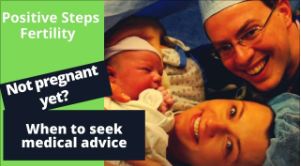Though many joke infertility isn’t hereditary (if your parents didn’t have children, it couldn’t apply to you), PCOS is an important exception.
PCOS is short for polycystic ovarian syndrome, which relates to an overabundance of eggs and is a top reason for not only subfertility but irregular cycles.
Some think one can’t get too much of a good thing, but with eggs that isn’t always the case. Eggs can actually get in each other’s way of blocking release. While many women worry if they stop having their cycles it’s because of ovarian failure, particularly for young women with irregular periods it comes from too many eggs, especially after weight gain. Some women have PCOS from menarche, but others (often after finishing high school) get that freshman five, fifteen, or fifty pounds and that is when their cycles become irregular. If weight gain leads to cycle irregularity, these are the women for whom weight loss is more likely to result in monthly periods again.
The reason extra eggs cause irregular cycles is because they make male hormone which gets other eggs to stop developing (and can lead to some extra hair on the face, lips, cheeks, etc.). The male hormone also drives abdominal fat deposition (resulting in more of an apple than a pear physique), which increases insulin levels (e.g. prediabetes), which overlaps in helping make more male hormone, and the cycle continues.
Weight loss helps lower insulin levels, which can help stop this vicious cycle. Similarly, birth control pills can lower production of testosterone as well as how much male hormone the body can interact with, also helping. (However, birth control pills can take six months or more before one sees an improvement in the extra hair.)
For women with PCOS wanting a baby, birth control pills won’t help fertility.
Similarly, while weight loss can improve chances, this often isn’t enough for many women, particularly if they’ve already tried to lose weight for years. In this case, fertility medications for “ovulation induction” can help, but one has to be particularly careful with women who almost never have cycles. The reason is just blindly taking medications without ultrasound to monitor how the ovaries respond can result in far too many eggs being recruited, causing complicated multiple gestation pregnancies. Kate Gosselin having sextuplets is the perfect example of a 28-year-old with PCOS who got too many eggs during treatment. However, there are ways of minimizing risk.
Similarly, if you are wanting to build your family, we would love to help you. From simple explanations, to high tech solutions, or a simply a fresh perspective if what you’ve been doing on your own or with a doctor hasn’t worked, come see us in our Monroe, Shreveport, Madison, Starkville or Hattiesburg MS offices.
Call us at 855-759-4124 and let’s help you have the child of your dreams!
J. Preston “Pres” Parry, MD, MPH




